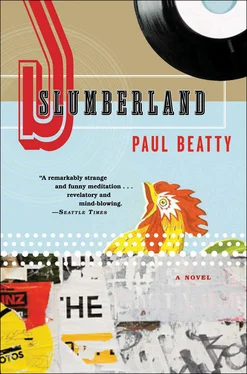Without fail at the end of the night the visiting musicians would take out their instruments and tell the Schwa they’d be honored if he would play with them. I always hoped he’d say yes. If he said yes to Charles Gayle or Peter Kowald, then maybe, if I begged him long enough and promised him the world, he’d say yes to me and agree to bless my beat. But he’d always turn them down.
He turned everyone down except Fatima. Fatima and Charles had some special connection. They seemed to lighten one another’s moods, and the Schwa doted on her as much as a broke nonplaying musician could.
Klaudia and Fatima were the Rosa Parkses of Slumberland integration. To my knowledge, before them no black female had ever set foot in the place. Whenever they came through, the regulars treated them like black-hatted gunfighters blown into town by an ill wind. Petrified, the locals would duly deputize a couple of brave white women to find out what the dark strangers wanted. At the first sign of trouble I always backed off, imagining the conversations from the safety of the far side of the room.
“In this here saloon we don’t cotton to strangers looking for trouble.”
“We ain’t looking for trouble, but we ain’t runnin’ from it neither.”
Then the stare down until the Schwa brokered an uneasy truce by buying a round of drinks with my money. After one narrowly averted bar brawl, Fatima said to the Schwa, “How about a song?”
Unable to refuse her, he achingly kicked his way across the sandy floor to the center of the bar and scanned the room with those baggy auburn eyes. It took me a second to realize that he was looking for an instrument to play. Gauging the chair backs, swizzle sticks, and beer bottles for their kinetic musicality. Seeing nothing that met his needs, he removed a paperback book from his jacket pocket and cleared his throat.
“What’s he doing?” I whispered to Lars.
“He’s going to accompany himself with a book.”
I hurriedly took out my minirecorder and pressed the record button. Visions of bootleg riches danced through my head.
Lars giggled.
“What?”
“They say you can’t record him without his permission. It’s like taking a photograph of Dracula, you’re not going to get anything.”
The Schwa ruffled the pages of the book over his pant seam, and the resulting sound rivaled that of the best Max Roach brushwork. I nearly fainted. He lifted the book to his mouth and played chapter seven like a diatonic harmonica; blowing and drawing on the pages like leaves of grass in the hands of Pan. Who knew a Signet paperback was in the key of D? For the more percussive sounds he rapped the spine on his elbow, thumb drummed page corners, pizzicatoed the preface, flutter tongued the denouement, and bariolaged the blurbs.
Brothers, will you meet me.
John Brown’s body lies a-mouldering in the grave;
John Brown’s body lies a-mouldering in the grave;
John Brown’s body lies a-mouldering in the grave;
His soul’s marching on!
His voice. His voice was a magical confluence of Louis Armstrong, the thrush nightingale, and Niagara Falls at midnight.
After he finished there was no applause. Applause wasn’t a deep enough show of appreciation. People called their lawyers and had him written into their wills. A South African diplomat approached him about running against Nelson Mandela in the next election. A widow from Wilmersdorf gave him her mother’s secret recipe for Choucroute Alsacienne .
I immediately went to play back the concert, but to my dismay couldn’t find my minirecorder. Panic stricken, I asked Lars if he’d seen it and he stopped composing the ode he was dedicating to the Schwa long enough to point his pen at the floor. There, coated in sticky wine-soaked sand, was my minirecorder. Too cowardly to hear the results, I held the recorder to Lars’s ear and pressed play. He shrugged his shoulders.
“Nichts.”
Fuck.
I put the speaker tight to my own ear. Lars was right. Nothing, not even tape hiss, which is impossible — there’s always tape hiss. The myth was true: The Schwa could be recorded only when he felt like being recorded. I was having trouble breathing, too much magic realism, idolatry, and Color Purple mysticism for one night.
Stone dropped some coins into the jukebox. A breezy Bob Dylan tune filled my lungs with air. After perusing the song list for a moment, he ambled over to me, a devious thin-lipped sneer slicing across his freckled face.
“ Whikrxx-whikrxx-whurr ,” he said. He was mocking me, imitating Grandmixer D.ST’s legendary scratch from Herbie Hancock’s 1983 “Rockit.” “ Whikrxx-whikrxx-whurr . Taurus the Bull. Taurus the Bull.” Very funny.
We never talked much. He never said anything, but he was pissed at me for dragging him into the public light, however dim it was. I think he felt belittled that a DJ, the bane of his existence, had been the only person willing to seek him out and dust him off. To him DJing was single-handedly responsible for the complete ruination of music. His frustration with the concepts of the turntable as instrument and the DJ as musician was understandable.
Niels Bohr once said, “Anyone who is not shocked by quantum theory has not understood a single word,” and in the summer of ‘83 any listener who wasn’t shocked by the turntable work on “Rockit” was deaf. That grating chatto rhythm is to modern music what quantum mechanics is to physics, except that D.ST wasn’t concerned with the subatomic but the sub-sonic. He wanted to know not what atoms looked like but what they sounded like. His ministrations on that hit single proved what earlier theoreticians — Kool Herc, Albert Ayler, and every headbanging teenager who played their heavy metal records backward looking for satanic messages — had only postulated: that by manipulating rhythm and pitch, one could use melody to bend the space-time-summer-love continuum that is recorded sound. D.ST had transformed the turntable into both instrument and time machine. For me that whikrxx-whikrxx-whurr was a call to arms for an old jazz confederate like the Schwa, the “Rockit” video was an air raid siren signaling a firestorm, and the turntable was Grant burning Atlanta. He heard something in the music, saw something in Herbie Hancock’s eyes, the splay of his fingers across the keyboard, that I wouldn’t feel until years later. He heard jazz sublimating itself to the turntable; and for the first time in his life he heard a jazzman play something he didn’t feel. He heard a jazzman running scared.
Something in the Dylan tune distracted him. Could’ve been the lyric. Might’ve been the violin. Or the way Dylan sings “reflection” as if it were a monosyllabic sigh. There was a hint of regret in his face. The now-or-never disillusionment of a lonely man who’d woken up in Germany on his fifty-fifth birthday and wondered what the fuck had he done with his life.
Any day now . .
Any day now . .
“That’s an excellent jukebox, man.”
“Thanks.”
“Lars tells me you have a beat,” he said.
“I do.”
He nodded approvingly. “Here,” he said, placing the book he’d just finished playing on the table.
I think he expected more of a reaction from me, as if he were Gabriel handing me the horn he just used to blow down the wall of Jericho, but it was just a book. The Sound and the Fury .
“Faulkner is the greatest DJ who ever lived,” he said, pressing his index finger to the cover, and again mocking me by jiggling it back and forth.
“Whikrxx-whikrxx-whuurr.”
I flipped the book over and skimmed the back cover. Each character was described in two words— beautiful, rebellious Caddy. . the idiot man-child Benjy. . haunted, neurotic Quentin. . and Dilsey, their black servant . Apparently Dilsey didn’t have a personality, unless black servant is a psychiatric disorder. At first I misinterpreted his gift as a passive-aggressive gesture. The musical contemporary’s equivalent of offering peppermint candy to a friend who has bad breath and doesn’t know it. Then I remembered Philip Glass and Beckett.
Читать дальше












